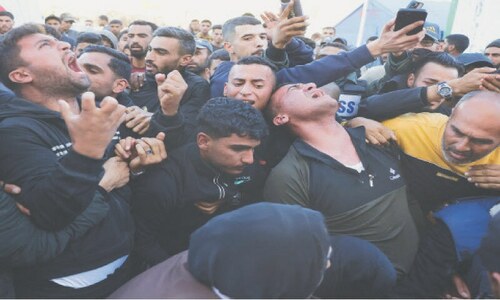KARACHI: Three senior doctors of the city, including a former director general of health, lost their lives during the past two days due to complications caused by Covid-19, raising alarm among healthcare providers.
So far, 46 doctors have died of the coronavirus in Sindh. Of them, 26 doctors were based in Karachi.
Sources said Dr Waseemuddin was a paediatrician, Prof Abdul Sattar Korai, the former DG-Health, Sindh, an ENT specialist and Dr Tahir Amin Chaudhary who had retired from the Jinnah Postgraduate Medical Centre as chief anaesthetist.
Dr Waseemuddin died on Friday morning and Dr Korai and Dr Chaudhary passed away on Thursday night.
According to official data, 6,791 doctors, 1,360 nurses and 2,774 hospital staffers have caught coronavirus in country
According to the data compiled by Pakistan Medical Association (PMA), a total of 142 doctors have died of coronavirus in the country; 61 in Punjab, 46 in Sindh, 26 in Khyber Pakhtunkhwa, five in Balochistan, one in Gilgit-Baltistan, three in Azad Jammu and Kashmir.
So far, 26 paramedics have died of Covid-19 in the country. Five of them worked in Karachi.
PMA calls for investigations
“The situation calls for immediate investigation to see why so many doctors are getting infected and dying of Covid-19. If this is not done, patients would suffer as the country already faces an acute shortage of doctors,” said Dr Qaiser Sajjad representing PMA.
Several doctors were in isolation while many had stopped their practice, fearing Covid-19 infection, he added.
About the factors contributing to high Covid-19 infection rate among healthcare providers, particularly doctors, Dr Sajjad said doctors were not getting proper protection, indicating an acute shortage of personal protective equipment at hospitals.
“Doctors are forced to work in poor conditions. There are no checks at entry and exit points of healthcare facilities, increasing chances of infection among the staff,” he said, adding that doctors were often not provided with rooms to sit and relax after long duty hours.
With the second wave, he pointed out, people were more relaxed and have withdrawn all kinds of preventive measures earlier put in place. “Everyone is allowed to enter a hospital without any monitoring. There is no restriction on the number of family attendants that was earlier put in place during the first wave of coronavirus,” he said.
‘Non-Covid patients’
According to Dr Sajjad, the PMA data showed most doctors who had fallen victim to coronavirus handled “non-Covid” patients.
“In fact, they were asymptomatic coronavirus patients. All patients should be handled as suspected coronavirus patients unless lab reports show that the patient is coronavirus negative. Last but not the least, there is a strong possibility that doctors are contracting the infection in private gatherings,” he added.
He also spoke about the economic hardships being faced by doctors and said they were deprived of the risk allowance and the government was not even releasing their salaries on time.
“Please make a system for the financial support of healthcare providers falling victim to coronavirus. Families of victims desperately need government assistance. The Shuhada Package announced by the federal and provincial governments in September for the families of doctors dying of Covid-19 hasn’t been implemented yet,” he said.
According to the statistics released by the health ministry, so far 10,925 healthcare workers have contracted Covid-19, including 6,791 doctors, 1,360 nurses and 2,774 staffers of the hospitals. Overall 10,038 healthcare workers have recovered from the virus while 666 are under isolation after testing positive for Covid-19.
Published in Dawn, December 13th, 2020

















































